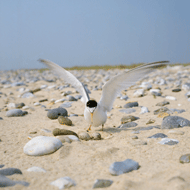Seven clutches of little tern eggs ’stolen’ in Norfolk

Little tern at nest, wing stretching after incubating. Image: Chris Gomersall (rspb-images.com)
Norfolk police are investigating the suspected theft of seven clutches of little tern eggs from Winterton Beach, North Norfolk.
Little terns are one of the UK’s rarest seabirds, with around 1,500 breeding pairs in the country. Volunteers and staff from the EU Life+ Little Tern Recovery Project work shifts to monitor the nests in daylight hours, when the birds are most vulnerable to disturbance.
In the early hours of the morning on 20 June, however, RSPB wardens discovered that up to 20 eggs had been taken. Human footprints were found leading up to each nest.
Under the Wildlife & Countryside Act 1981 it is an offence to intentionally take or destroy the egg of any wild bird. Fabian Harrison, from the RSPB, called the suspected thefts “devastating”.



 The latest
The latest